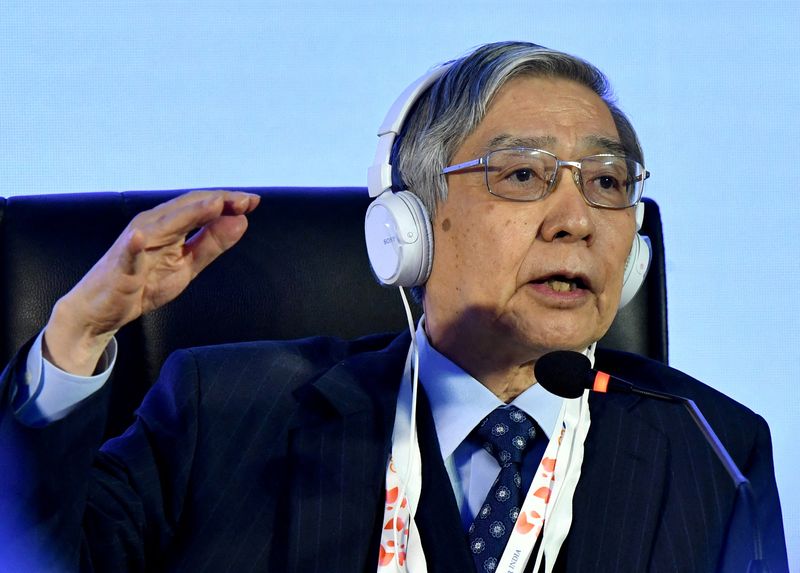By Leika Kihara
TOKYO (Reuters) -Haruhiko Kuroda took a slightly less dovish tack in his farewell as Japan's central bank chief on Friday, ending a decade of unconventional policy that included a "bazooka" of stimulus aimed at boosting inflation and sustainable growth.
Handing the reins of the Bank of Japan (BOJ) to academic Kazuo Ueda, Kuroda pointed to progress under his radical easy-money policy, which featured a push to change public perceptions with a wall of money and Peter Pan metaphors.
"Japan's 15 years of deflation has created a strong perception among the public that prices and wages won't rise," Kuroda, 78, told a news conference marking the end on Saturday of his second five-year term.
"But such a perception, or norm, is starting to change. As such, I think the timing for achieving the BOJ's inflation target stably and sustainably is nearing," he said.
Kuroda said it was "quite possible" for the BOJ to exit its monetary easing without upending the banking system.
Shock therapy was among key features of Kuroda's monetary experiment. When then-Prime Minister Shinzo Abe chose him in 2013, Kuroda led the BOJ in deploying a huge asset-buying programme, partly to convince the public that prices would finally start to rise after decades of deflation.
Kuroda was not the first BOJ chief to attempt to influence public perceptions with monetary easing. Toshihiko Fukui, who presided from 2003 to 2008, frequently expanded quantitative easing to "show the BOJ's determination to beat deflation" and "exert stronger influence on public expectations."
But Kuroda went a step further, binding policy to his 2% inflation target and setting a two-year timeframe for meeting the goal. The target remained elusive only until recently, when the war in Ukraine boosted global commodity prices and pushed Japan's inflation well above 2%.
'YOU CAN FLY'
Simple communication was another feature of Kuroda's policy. In 2015, he used the Peter Pan fairy tale in explaining that to fire up inflation, the BOJ needed to have the public believe in its monetary magic with massive stimulus.
"I trust that many of you are familiar with the story of Peter Pan, in which it says, 'The moment you doubt whether you can fly, you cease forever to be able to do it'," he said then. "Yes, what we need is a positive attitude and conviction."
In another speech that year, Kuroda described how, like a spacecraft attempting to move away from Earth's gravitation, "tremendous velocity" was needed to end Japan's deflationary equilibrium.
When allusions to Peter Pan and spacecraft failed, the BOJ shifted to a defensive, long-term approach in 2016 with the introduction of yield curve control (YCC). The hope was that by capping long-term rates around zero and patiently reflating the economy, inflation would eventually perk up.
The shift to YCC also sought to stop super-long yields from falling too much, a nod to growing concern that prolonged low rates could hurt financial institutions' profits enough to discourage them from boosting lending.
"The BOJ's thinking on interest rates changed dramatically in 2016. It abandoned the idea that the lower the borrowing costs the better," said former BOJ board member Takahide Kiuchi.
If Japan sees inflation sustainably hitting 2%, incoming BOJ chief Ueda will face a fresh communication challenge of steering a smooth exit from his predecessor's radical stimulus.
Kuroda said managing expectations may be harder under a conventional policy targeting short-term rates than under unconventional policies, in which central banks can directly control long-term rates with asset purchases, instead of seeking to push them down through forward guidance.
But central banks must accumulate expertise to make unconventional monetary policy more effective, said Kuroda, who said he may take on a teaching job after retiring from the BOJ.

Some analysts, however, doubt whether central banks should continue to rely heavily on unconventional tools.
"During Kuroda's era, the BOJ put in place a mixed bag of unconventional measures," Kiuchi said. "The BOJ's failure to change public expectations raises a lot of questions about the effectiveness of unconventional monetary policy."